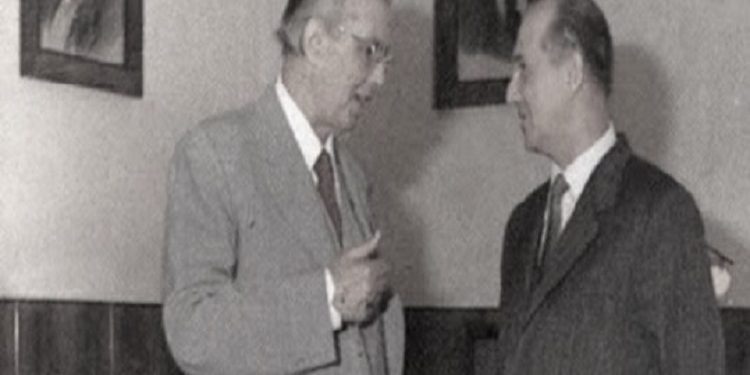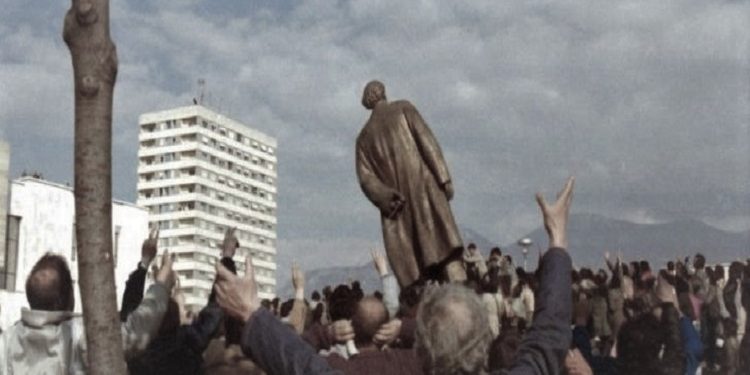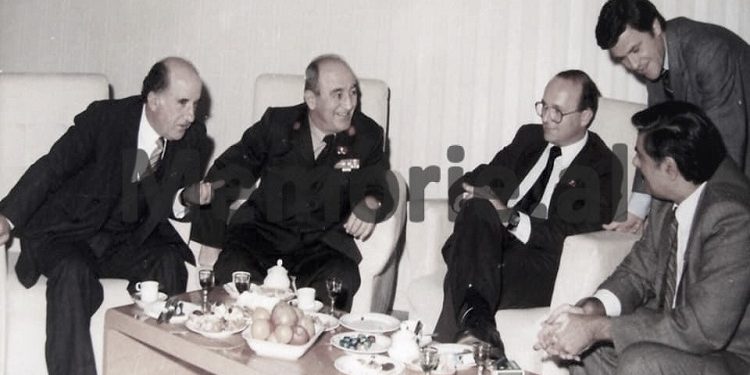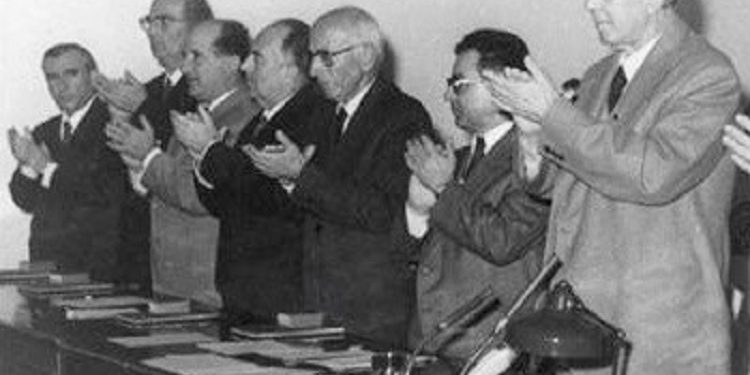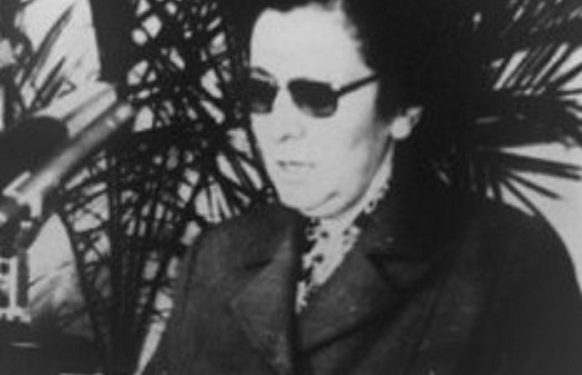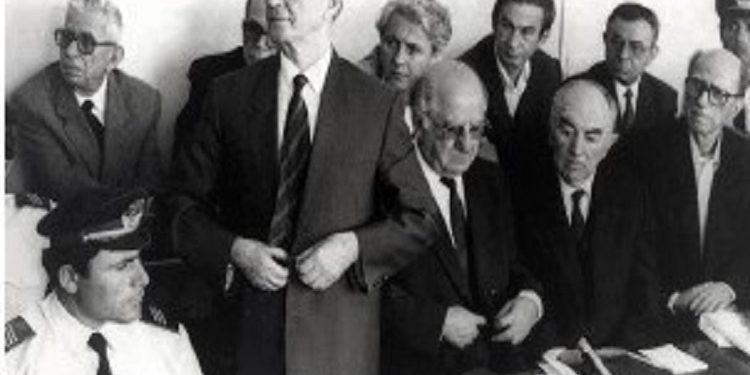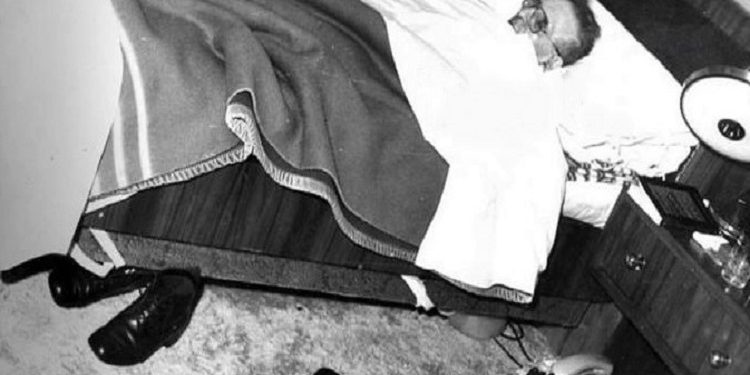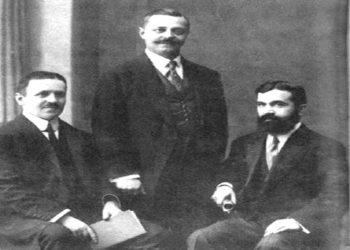By Bashkim Trenova
Part forty-three
Memorie.al publishes the memoirs of the well-known journalist, publicist, translator, researcher, writer, playwright and diplomat, Bashkim Trenova, who after graduating from the Faculty of History and Philology of the State University of Tirana, in 1966 was appointed a journalist at Radio- Tirana in its Foreign Directorate, where he worked until 1975, when he was appointed as a journalist and head of the foreign editorial office of the newspaper ‘Zeri i Popullit’, a body of the Central Committee of the ALP. In the years 1984-1990, he served as chairman of the Publishing Branch in the General Directorate of State Archives and after the first free elections in Albania, in March 1991, he was appointed to the newspaper ‘Rilindja Demokratike’, initially as deputy / editor-in-chief and then its editor-in-chief, until 1994, when he was appointed to the Ministry of Foreign Affairs. with the position of Press Director and spokesperson of that ministry. In 1997, Trenova was appointed Ambassador of Albania to the Kingdom of Belgium and to the Grand Duchy of Luxembourg. Unknown memories of Mr. Trenova, starting from the war period, his childhood, college years, professional career as a journalist and researcher at Radio Tirana, the newspaper ‘People’s Voice’ and the Central State Archive, where he served until the fall of the communist regime of Enver Hoxha, a period of time when he in different circumstances met many of his colleagues, suckers of some of the ‘reactionary families’, etc., whom he described with a rare skill in a book of memoirs published in 2012, entitled ‘Enemies of the people’ and now brings them to the readers of Memorie.al
Continued from the previous issue
WITH “HEROES OF THE PEOPLE”
POLITICAL BUREAU AND THE PRESIDENCY
The tragic fate of Fiqret Shehu and her family after Mehmet’s “suicide”!
Fiqretja may have made her statements or testimonies under the pressure of torture or being on drugs. The film sequences that show him in the role of the witness, give us a completely bleached Figs within a few weeks. Fiqeretja may have thought that by “helping” the Party, she or at least her children would escape death! Indeed, the dictatorship of the proletariat, to which she and her husband had faithfully served, would not spare her either. She died mysteriously in the prisons of the dictatorship. It is suspected that he was poisoned. Her body was not given to relatives to bury! Not only that. Tragic fate did not spare her family either.
The eldest son of Mehmet and Fiqereta, Vladimir, who lived in Gramsh, one day suddenly found himself “suicidal”! His body was found carbonized in an electrical transformer. Even the two youngest sons of Mehmet and Fiqerete Shehu did not escape arrest and imprisonment. Bashkim was arrested along with his mother and suffered in communist prison cells until 1990. Likewise, the other son, Skënderi, suffered the same fate. The wife and children of the Union were interned in Belsh, Elbasan. I met the union in the editorial office of the newspaper “Rilindja Demokratike”, after he was released from prison. He is the only child of the senior leadership of the Albanian communist state, who has maintained a critical attitude towards his father, certainly without approving the sayings of Enver or Nexhmije Hoxha.
Mehmeti, in a letter that is said to have written about Enver Hoxha before committing suicide, begs him to take care of Fiqreta and the children. Enver Hoxha not only killed his wife and eldest son, not only imprisoned other children, not only killed, imprisoned or interned all his brothers and relatives, but also destroyed the grave of Mehmet Shehu. Mehmet’s remains ordered to be buried by a river in a secret place near the capital.
Was Mehmet Shehu really an agent or a polyagent of foreigners? It seems to me that he was as much an agent and polyagent as Enver Hoxha himself. They both, like all politicians with primitive mentalities, wherever they are, have servilely served anyone who served their throne. They both, alike, have been sworn enemies only of those who have violated or intended to encroach on this throne. Even the sometimes passionate and sometimes stormy relationships between them do not go beyond this logic. The widow of the dictator, Nexhmije Hoxha, in an interview given in recent years in the Albanian press, to the question whether Enver Hoxha is the one who killed his friends, answers: “Enver did not kill his friends, on the contrary. His friends betrayed Enver, lost their temper a little with the thought that this Enver lived a little longer. So not everyone thought about power. The main role here was probably that of Mehmet Shehu “Following this interview, she adds: “I knew both Fiqret and Mehmet very well, I even knew Fiqret more. She… was not Mata Harri’s type “. Fiqreti, according to Nexhmije Hoxha, is also presented as a shy, closed man. So neither one nor the other appears as agents of foreign espionage services, for which they were convicted, Mehmet Shehu even as an old agent recruited before the war. He more or less reaches the same conclusion after reading in the Albanian press an interview of Ramiz Alia, the successor of dictator Hoxha.
Ramiz Alia with two contradictory answers to each other, if Mehmet shehu was a polyagent!
Ramiz Alia is known as one of the strongest critics of Mehmet Shehu at the meeting of the Politburo, which also determined his end. He repeated for several years the accusations “against the gang of conspirators, coup plotters and terrorists led by the polyagent Mehmet Shehu”, as he did on September 12, 1983 in a daily meeting of the secretaries of the Central Committee of the Party. Then, in one of his interviews, about 30 years after the murder or suicide of Mehmet Shehu, when asked if Mehmet Shehu was an agent or a polyagent, he answers: “If you ask me the question, was it? I tell you I do not know, I cannot say whether it was or was not. I have no documents. ” In another interview given to the TV channel “ABC”, not far in time from what I quoted above, he answers the same question: “If Mehmet had been like that since 1942-’43, when he was in the concentration camp, until 1981 when he killed himself, they say 40 years. What waited? He was in charge of the country. If he was an agent of the Americans or the British, what more did they want to pave Albania?! Mehmet would have acted. But so far it has not acted … From this point of view, the conclusions on that issue are questionable “! What words of Ramiz Alia should we believe? Was Mehmet Shehu a polyagent, it is not known or he was not?
Such has been and remains such Ramiz Alia throughout his life. In one of my first articles in the newspaper “Rilindja Demokratike”, when he was still president of Albania, when the Labor Party was still in power, I compared him to their ballerinas and pirouettes. Actually this comparison was not quite striking. In the pirouettes of ballerinas he finds art, craftsmanship, aesthetics, and perfection. Behind Ramiz Alia’s pirouettes he sees a man without personality, without axis, without manhood, a twisted wire.
Ramiz Alia was not a criminal like Enver Hoxha, but that did not stop him from enthusiastically supporting and following Enver Hoxha’s crime path. He was not a dictator by nature, but that did not stop him from worshiping the dictator. Ramiz was calm in nature, but this did not stop him from giving orders to kill every Albanian who tried to cross the state border, to expose the killed in the streets of the cities to arouse terror and panic. According to the official documents of the time, only from May 23, 1990 until July 8 of the same year, 13 citizens were killed at the Albanian border, who wanted to cross it illegally. The gentle, collegial Ramiz, who promised to democratize Albania, did not hesitate in the meantime to order a firearm to be fired at the people, who tore down the dictator’s monuments and to thousands upon thousands of demonstrators shouting “Freedom-Democracy”! In short, in my opinion, if Enver Hoxha was a more devout Stalinist than Stalin himself, Ramiz Alia was a Stalinist castrated by Stalinism. He was for a “democratic” dictatorship, but also for a democracy, i.e. a dictatorial “democracy”! In himself he felt small, powerless to be a statesman, regardless of the political system. He himself said: “I, taking the post of Enver Hoxha, felt very small to be Enver Hoxha”. He has always seen Enver Hoxha kneeling in front of him. Ramiz did not dare to stand up even after his death.
Indeed, initially, being different from the dictator, Ramiz Alia was also viewed differently by certain social strata. There was also hope that he would make a difference. I thought so too. History gave him a chance. Ramiz would soon show that he was “too small”, no longer for big changes, but also for small changes. As such he never aroused either respect or fear, even among the communist dome, which had been brought up only to tremble before the dictator.
Hekuran Isa’s statement in court, that he had received orders from Ramiz Alia to shoot at the crowds!
I remember a brief conversation I had with Besa Isa in early December 1990. Besa was working at the time, just like me, at the Central State Archives. She was married to the son of Hekuran Isa, who was a member of the Politburo and Minister of Interior. Besa, in general, was a quiet, somewhat withdrawn girl. On one of the first days of the Democratic Movement, when the dictatorship had taken the tanks to the streets, it came to my office. She seemed worried. We talked about the electrified situation in the country. I was curious to know that Hekuran Isai, her father-in-law, was crazy. As she told me, ‘Father’, this is how she called her father-in-law; she had expressed herself with the words: “He will not allow me to be used as a Turkish head”! Later, after the victory of democracy, Hekuran Isai will declare before the court that he had received an order from Ramiz Alia to shoot at the revolted crowds, who overthrew the statue of the dictator, but he had not carried out this order. A similar statement was made by the former Minister of Defense and former Chief of General Staff, Kiço Mustaqi. In an interview given to “Gazeta Shqiptare” on May 11, 2011, he shows that he did not follow the order of Ramiz Alia to take the army to the streets.
“Ramiz Alia”, says Kiço Mustaqi, “should not come out now and say that he saved Albania from the civil war, because he demanded this war by giving orders to intervene militarily against the people”. I think that in order to save his head, in order not to bear any responsibility, Ramiz Alia gave the order orally, so he gave it and he did not give it. This is in his nature. In fact, at a meeting of the plenum of members of the Tirana Party Committee, which was held on the day of the fall of the statue of the dictator in Tirana, Ramiz Alia admitted that he gave the order to shoot at the crowd, but to shoot in the direction of the feet! He accused Hekuran Isain in this meeting that he did not carry out the order. If he had been killed, Ramiz would have said that his order was to shoot him in the legs. Others would be held accountable for the killings. The others, for their part, did not have to go as “Turkish heads” on behalf of Ramiz Alia. That is why both Hekuran Isai and Kiço Mustaqi did not carry out the order. Before Enver Hoxha they would not have dared to make such a rebellion. Ramiz Alia was not Enver Hoxha, but time was no longer that of Enver Hoxha. Ramiz himself, Hekurani or Kiço Mustaqi, were aware of this. In fact, very soon this time would pass, leaving behind great shortcomings, especially an undemocratic, authoritarian mentality.
My four meetings with Ramiz Alia!
I have met Ramiz Alia four times. I had my first meeting in the editorial office of the newspaper “Zeri i Popullit”, shortly after I started working there as a journalist for the Foreign Sector. At that time Ramiz Alia was the secretary of the Central Committee of the Party for ideology. He had come to the office of the then editor-in-chief, Xhelil Gjoni, together with Enver Hoxha’s adviser and his on international issues, Sofokli Lazri. Ramiz Alia requested that the editorial office of “Voice of the People” prepare an editorial for the publication of an international meeting that the pro-Soviet Communist Parties would hold, if I am not mistaken, in Bratislava, Czechoslovakia. I had to work on the article. Articles of this character until then were prepared only by the Central Committee of the Party. For the first time, the Voice of the People was being asked to write such an editorial. I certainly felt valued, but I would not dwell too long on this illusion. Sophocles Lazri would “wake me up” from the beautiful dream. I will talk more about the above when I write about Sofokli Lazri or Xhelil Gjoni. For the second time I met Ramiz Alia again while I was still a journalist in “Zeri i Popullit”, but this time the meeting did not take place in the offices of the Editorial Office. As far as I can remember, in 1977, he came for a visit to my house on the occasion of May 5, Martyrs’ Day. It was a completely protocol visit.
Communist leaders across the country marched on May 5 through the families of martyrs, ostensibly to show continued respect for the martyrs and, more precisely, to justify their power with all its perversions, posing as comrades, followers of the dream of martyrs, of their ideal. Ramiz Alia, in fact, would not be remembered at all for the martyrs of my family, just as other communist leaders had not been remembered before, nor would they be remembered after, except for a visit by Lenka Çuko. It was Niazi Çepani, chairman of the Neighborhood Democratic Front and a veteran friend of my mother, who proposed our family as Ramiz Alia’s host for May 5th.
From this meeting with Ramiz Alia, I remembered a dialogue of my mother with him. At that time, the senior leaders of the Party, when they went for protocol visits to their friends or, as it was said, “to the people”, also had to drink coffee from the coffee that their companions brought with them. This was done for security reasons. We had put on the small table, standing in the middle of the room, a plate full of apples. We, as a family of martyrs, had the annual privilege of securing a state authorization to buy on May 5, four or five kilograms of apples. Of course, an apple was worth a fortune. To secure it you should have shed blood in the War! My mother, wanting to honor her friend as best she could, insisted that he get an apple. She insisted so much that she told Ramiz Alia that he could not leave without trying an apple. How did my poor mother know that Ramiz Alia, like everyone else in the communist dome, lacked nothing, not even the swallow’s milk, if he wanted it! Where could she think of it, but also of me, that he also had to be careful and protected from the families of the martyrs, from a cup of coffee and why not from an apple! Finally Ramiz Alia, laughing, surrendered. He agreed to take the apple. My mother was happy!
How many times I have remembered this scene, over the years, it has aroused a deep sense of sadness in me. One of our great poets, Migjeni, to show the extreme poverty of the Albanian peasant during the period of the Monarchy, wrote “The Legend of Corn”. Corn was then the staple food for most of the Albanian population. In communism, many more were added to this legend. In fact, communism turned everything into a legend, even an apple, an orange, an egg, a sweater, a pair of shoes, water, light, a trip, a book, a song, a correspondence, etc. etc.
Ramiz Alia criticized me that I had gone for tourism in France!
After May 5, ‘Martyrs’ Day’, I met with Ramiz Alia on another occasion while continuing to work at Zeri i Popullit. I believe it was the beginning of 1981 when he came to a meeting with the newspaper editorial office. I remember the date approximately, because not long ago I had returned from France where I accompanied as a journalist the State Ensemble of Folk Songs and Dances, during his tour in this country. In his conversation he mentioned this.
Ramiz Alia spoke at length in the editorial office of “Voice of the People” about current issues and perspective. His conversation was theoretically correct. He told us how an editorial office like that of the “Voice of the People” should act. “Here,” he said, “was the Union in France with the Ensemble, but what did it do? Nothing. Went for tourism! It seemed to me as if he was not informed of my work. I could not bear it and I intervened, saying: “How about tourism, comrade Ramiz?! After each show, I sent information to our embassy in Paris. This was forwarded to the Albanian Telegraphic Agency, which then distributed it to the media for publication or broadcast “. Ramiz Alia, apparently, like all senior Party leaders, was not accustomed to clarifying. They knew everything and were sure of everything. He immediately found an “argument” to shut me up. “No, no,” he said.
Formally he was right. I was not affiliated with the Editorial Office. I had acted as I had been told, as all other journalists who had accompanied artistic groups or ensembles abroad had acted before, and as everyone else would in the future in similar cases. So I had acted on the basis of an approved and unchanging practice. In order to act differently, to contact the editorial office directly, the telephone conversations would have to be covered financially. I, like all my colleagues in similar cases, have not been given a single cent. The French tour organizers paid for accommodation, meals and $ 3 a day in pocket money for each member of the Ensemble and his entourage. Ramiz Alia knew all this, of course, but he wanted to “forget” them. Thus, in this case, he created for himself the opportunity to show how much he was connected with the problems of the press and its functioning. He also showed us the distance between what the Party demanded from journalists and what we achieved, which was insufficient, critical. If we speak the language of the time, this should be understood as “The party was opening new horizons for us”. I wanted to explain again, but from behind I felt the hands of colleagues pulling me out of the jacket to force me to sit down and not stretch it anymore. I later realized that they were absolutely right.
In this meeting Ramiz Alia also spoke about the prospects of the Albanian press. He said that in the center of Tirana, somewhere behind the National Historical Museum, a multi-story building would be erected, which would house all the press. Even in this case he told us about how the work of the editorial office should be organized in these conditions. I again admit that his thoughts were right, but only theoretically. He was talking about organizing work in other conditions at a time when those conditions probably existed only in his head. He spoke, rightly, about the modernization of media work, but his words were uttered at a time when Albania was sinking deeper and deeper into the abyss of poverty and when the state budget reserves were not even enough to dispose of as savings an average retiree currently in the European Union. Was Ramiz Alia aware of this reality? I want to believe that yes, but maybe he did the job, said again in the language of the time, he demonstrated optimism, enthusiasm! It was then up to the journalists to multiply and spread everywhere, as real, this kind of optimism or enthusiasm, however deceptive.
I took the floor again and said: “Agreed, Comrade Ramiz, but to do all this you say, people are needed.” He reacted immediately, saying: “You are enough as people in the Editorial Office, look at the organization of work.” I replied: “We are 52 people in the Editorial Office, but only half of them are producers. The rest is administration. Again I felt from behind the hands of colleagues pulling me from the corners of my jacket not to stretch it anymore. To close this subject, one of the colleagues, sitting next to me, said: “Yes, comrade Ramiz, we are enough in the Editorial Office. “We have to look at the organization of our work.” I was surprised to hear his words, because he was the one who in the meetings of the Collegium, several times complained saying that the sector he led needed more journalists! My colleague was younger in age than I was, but apparently also much more practical. I last met Ramiz Alia in 1984 at the house of Myslym Peza where he had come together with Enver Hoxha and his wife, Nexhmija, on the occasion of Myslym’s death. I wrote about this meeting when I talked about Myslym Peza. Memorie.al
The next issue follows






